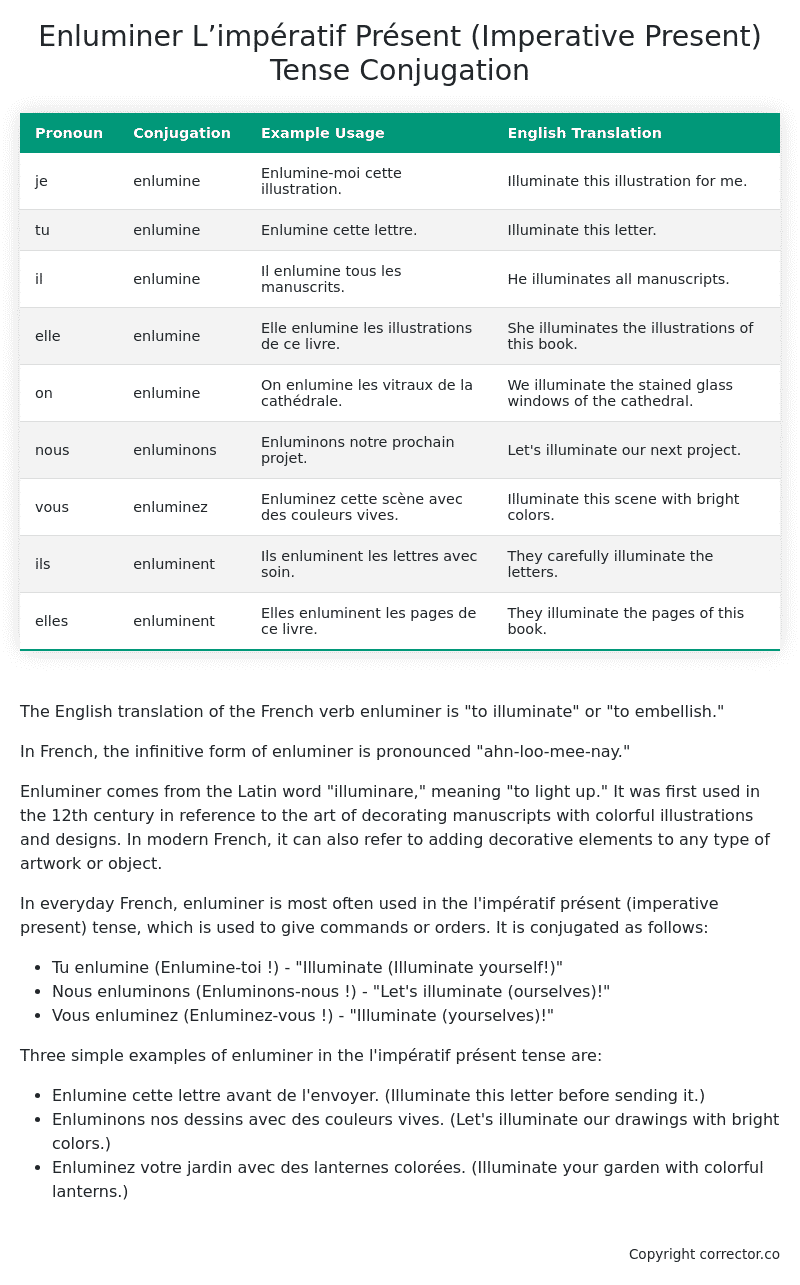L’impératif Présent (Imperative Present) Tense Conjugation of the French Verb enluminer
Introduction to the verb enluminer
The English translation of the French verb enluminer is “to illuminate” or “to embellish.”
In French, the infinitive form of enluminer is pronounced “ahn-loo-mee-nay.”
Enluminer comes from the Latin word “illuminare,” meaning “to light up.” It was first used in the 12th century in reference to the art of decorating manuscripts with colorful illustrations and designs. In modern French, it can also refer to adding decorative elements to any type of artwork or object.
In everyday French, enluminer is most often used in the l’impératif présent (imperative present) tense, which is used to give commands or orders. It is conjugated as follows:
- Tu enlumine (Enlumine-toi !) – “Illuminate (Illuminate yourself!)”
- Nous enluminons (Enluminons-nous !) – “Let’s illuminate (ourselves)!”
- Vous enluminez (Enluminez-vous !) – “Illuminate (yourselves)!”
Three simple examples of enluminer in the l’impératif présent tense are:
- Enlumine cette lettre avant de l’envoyer. (Illuminate this letter before sending it.)
- Enluminons nos dessins avec des couleurs vives. (Let’s illuminate our drawings with bright colors.)
- Enluminez votre jardin avec des lanternes colorées. (Illuminate your garden with colorful lanterns.)
Table of the L’impératif Présent (Imperative Present) Tense Conjugation of enluminer
| Pronoun | Conjugation | Example Usage | English Translation |
|---|---|---|---|
| je | enlumine | Enlumine-moi cette illustration. | Illuminate this illustration for me. |
| tu | enlumine | Enlumine cette lettre. | Illuminate this letter. |
| il | enlumine | Il enlumine tous les manuscrits. | He illuminates all manuscripts. |
| elle | enlumine | Elle enlumine les illustrations de ce livre. | She illuminates the illustrations of this book. |
| on | enlumine | On enlumine les vitraux de la cathédrale. | We illuminate the stained glass windows of the cathedral. |
| nous | enluminons | Enluminons notre prochain projet. | Let’s illuminate our next project. |
| vous | enluminez | Enluminez cette scène avec des couleurs vives. | Illuminate this scene with bright colors. |
| ils | enluminent | Ils enluminent les lettres avec soin. | They carefully illuminate the letters. |
| elles | enluminent | Elles enluminent les pages de ce livre. | They illuminate the pages of this book. |
Other Conjugations for Enluminer.
Le Present (Present Tense) Conjugation of the French Verb enluminer
Imparfait (Imperfect) Tense Conjugation of the French Verb enluminer
Passé Simple (Simple Past) Tense Conjugation of the French Verb enluminer
Passé Composé (Present Perfect) Tense Conjugation of the French Verb enluminer
Futur Simple (Simple Future) Tense Conjugation of the French Verb enluminer
Futur Proche (Near Future) Tense Conjugation of the French Verb enluminer
Plus-que-parfait (Pluperfect) Tense Conjugation of the French Verb enluminer
Passé Antérieur (Past Anterior) Tense Conjugation of the French Verb enluminer
Futur Antérieur (Future Anterior) Tense Conjugation of the French Verb enluminer
Subjonctif Présent (Subjunctive Present) Tense Conjugation of the French Verb enluminer
Subjonctif Passé (Subjunctive Past) Tense Conjugation of the French Verb enluminer
Subjonctif Imparfait (Subjunctive Imperfect) Tense Conjugation of the French Verb enluminer
Subjonctif Plus-que-parfait (Subjunctive Pluperfect) Tense Conjugation of the French Verb enluminer
Conditionnel Présent (Conditional Present) Tense Conjugation of the French Verb enluminer
Conditionnel Passé (Conditional Past) Tense Conjugation of the French Verb enluminer
L’impératif Présent (Imperative Present) Tense Conjugation of the French Verb enluminer (this article)
L’infinitif Présent (Infinitive Present) Tense Conjugation of the French Verb enluminer
Struggling with French verbs or the language in general? Why not use our free French Grammar Checker – no registration required!
Get a FREE Download Study Sheet of this Conjugation 🔥
Simply right click the image below, click “save image” and get your free reference for the enluminer L’impératif Présent tense conjugation!

Enluminer – About the French L’impératif Présent (Imperative Present) Tense
Usage
Giving commands
Making requests
Offering advice
Expressing desires
Conjugation Formation
Interactions with other tenses
Want More?
I hope you enjoyed this article on the verb enluminer. Still in a learning mood? Check out another TOTALLY random French verb conjugation!


